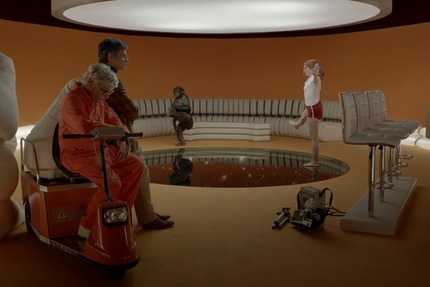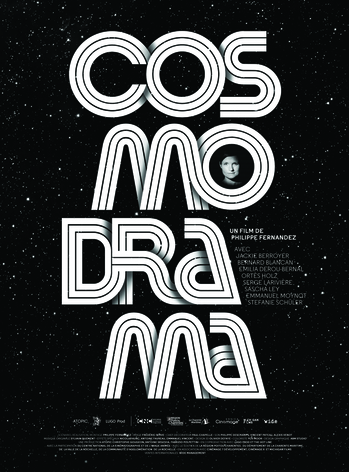Cannes 2015 Review: COSMODRAMA, A French Metaphysical Star Trek

The film opens on a white door opening with obligatory swoosh and whirl of smoke in an eager anticipation. A confused human (Bernard Blancan) totters out of the cryogenic chamber having been awaken from deep-sleep for yet unknown reason. As if by chance, the remaining crew members, "the astronauts", meet in corridors of the space vessel trying to figure out who they are and where are they heading. Soon, a temporary order of things asserts itself as every crew member takes over a specific and obviously necessary role, astronomer, director, biologist, semiologist (it´s a French crew) and there is even Sigmund Freud look-alike, an overly communicative chimp and a friendly dog.
The odd crew is just a sliver of Fernandez´s game appropriating and tweaking of genre codes to achieve his artistic vision. The general scenario of being stranded in uncharted territory with basically nothing on his astronauts hands but time opens the door for universal meditation on man´s place in space and more existentialist-tinged musings. Completely devoid of any space opera conventions, the characters are free to explore their chosen area that pertains to a vital part of human existence.
The protagonist, the first person on the scene, assumes a role of communication officer (credited as the reporter) broadcasting messages and trying to catch a signal from other living entities in the vastness of the universe. A mysterious woman appears periodically leaving cryptic messages. Soon, he becomes so consumed by this femme mystére (titled as wave woman) that his building obsession produces a dream about the subject of presumptive desire (out of his reach) featuring her countless clones (and monochromatic flight resembling Space Odyssey´s trip). Obviously, he spends lengthy conversations with fellow crewmember, Freud´s look-alike.
Fernandez remediates the fundamental questions on the universe and the mankind´s presence in it spared of any religious inkling whatsoever poking at metaphysics thus replicating the mythmaking endeavours of his many predecessors meandering to the dawn of humanity. Whether abandoned by its creator or being just a trivial by-product in the cosmic chemical laboratory, the human race never satisfyingly resolved the eternal conundrum inbred in its DNA. The structure of the stations of Holy Cross applied on Cosmodrama's narrative as the general framework bracketing each episode echoes Nietzsche´s "To live is to suffer, to survive is to find some meaning in the suffering," referring to the existentialist dimension of suffering and to survival as intellectual (philosophic) feat.
The style and poetics of Cosmodrama, despite being a highly authorial project, brings to mind the experimental take on the Kaspar Hauser myth in hugely underappreciated surreal electro-post-western oeuvre by David Manuli - which should be enjoying a cult following by now - The Legend of Kaspar Hauser. Though the main contact area might be the unexpected yet absolutely not ill-fitted presence of electronic beats in both films, their creators share unmatched vision on the universal theme and the abundance of talent to materialise it in an original form.
Manuli renders his black and white reimagining of Hauser in a visually raw style, shooting in exteriors and natural locations with the grainy texture of 35 mm adds to the effect. On the other hand Fernandez, shooting in the Studios de l´Océan in La Rochelle, meticulously composes every single tableaux. A professor of contemporary art who also teaches video art, Fernandez uses corridors consisting of grand unicolored planes enhanced by mesmerizing lighting to produce immersive images. Lensed by Frédéric Serve (cinematographer on impressionistic The End of Silence) with art direction by Paul Chapelle (Louise-Michel), the fixed shots in carefully selected angles and functional, minimalist set design form an absorbing spatial background for cosmo-drama, delivering seductive eye-candy with everything inside the frame painstakingly arranged and perfectly balanced to the last detail. Also worth mentioning is the spaceship´s retro interior design and costumes fashioned in the spirit of 70s, a very chic anachronistic retro-futuro spin.
Featuring long meditations on life, the universe and everything, Fernandez directs his troupe of existentialist astronomers in a deadpan style augmenting the detachment (after all, it is cosmological film not psychological one), stylisation and a bit of a surreal tone even tossing a few laughs along the way. Surprisingly enough, the strategy rworks and doesn't undermine or compromise the project, the fresh breeze of irony negating the undesirable notion of elitism when thoughtful and lengthy theorizations inundate majority of scenes.
A French "filmosophical" Star Trek, Cosmodrama is a treat for both visual receptors and mental ones, though some may find the glacial pace and the action vacuum more challenging than the labyrinth of metaphysical musings. The conspicuous transfixing images heavily compensate and reward the patience invested in Fernandez´s slow cinema cosmo-expedition.

Do you feel this content is inappropriate or infringes upon your rights? Click here to report it, or see our DMCA policy.







